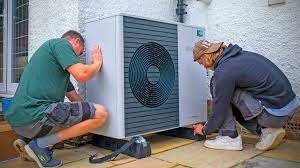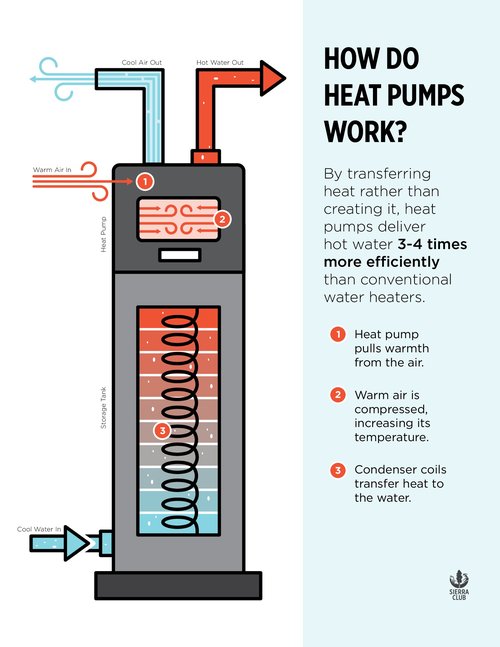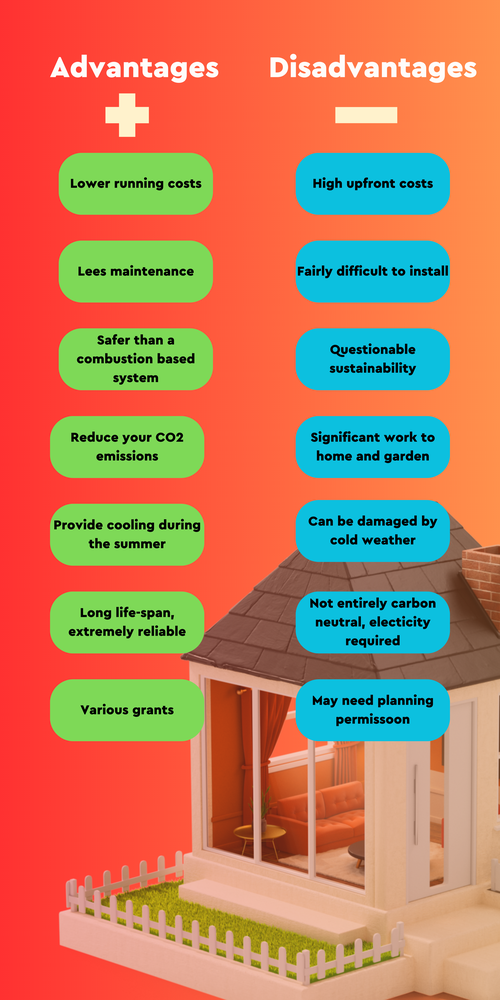Published on September 12th, 2023
Understanding Heat Pumps in 2023
Recently, heat pumps have gained significant attention for their remarkable ability to transfer heat from one location to another. This process involves utilising a compressor and a circulating system of liquid or gaseous refrigerant to extract heat from external sources (like the warmth of the garden soil or the outdoor air) and then transfer it into your home. This innovative approach results in notably reduced energy consumption compared to traditional boilers, often achieving an efficiency rate of 300-400%. Consequently, the heat energy generated surpasses the energy consumed.

Understanding Heat Pumps in 2023:
How They Work and Their Advantages and Disadvantages
In the ongoing pursuit of sustainable living and reducing our carbon footprint, modern advancements in technology are unlocking innovative solutions to age-old challenges. Hard to believe but the first heat pump dates back to 1876.
Among these, the unassuming yet remarkable heat pump has emerged as a star player in the realm of energy-efficient heating and cooling. As the world shifts its focus towards environmentally conscious practices, the spotlight on heat pumps grows brighter, offering a glimpse into a future where comfort and conservation seamlessly intertwine.
Gone are the days of relying solely on conventional heating and cooling methods that deplete finite resources and contribute to climate change. Heat pumps, with their ability to harness and redistribute ambient thermal energy, are leading the way in providing comfortable indoor environments while significantly reducing energy consumption and greenhouse gas emissions. With a symphony of technology, physics, and environmental stewardship, heat pumps are not merely appliances.
In this article, we embark on a journey through the world of heat pumps, delving into their mechanics, benefits, and their pivotal role in reshaping how we heat and cool our homes and buildings. We will explore the science behind their operation, demystify the various types available, and unravel the remarkable energy savings they offer. As we navigate the landscape of heating and cooling technology, we will uncover the reasons why heat pumps have become a cornerstone of the eco-conscious movement, driving us closer to a future where comfort and responsible living coexist harmoniously.
What Heat Pumps Are All About?
Recently, heat pumps have gained significant attention for their remarkable ability to transfer heat from one location to another. This process involves utilising a compressor and a circulating system of liquid or gaseous refrigerant to extract heat from external sources (like the warmth of the garden soil or the outdoor air) and then transfer it into your home. This innovative approach results in notably reduced energy consumption compared to traditional boilers, often achieving an efficiency rate of 300-400%. Consequently, the heat energy generated surpasses the energy consumed.
Moreover, the versatility of heat pumps extends beyond heating your home during colder periods. In the summer, the heat exchange process can be reversed, effectively transforming some heat pumps into an air conditioner for added comfort. This is most effective with air-to-air heat pumps.
The Role of Heat Pumps in Climate Goals
In light of current environmental priorities, the International Energy Agency's recent special report underlines the significance of phasing out new gas boilers by 2025 to align with the Net Zero targets set for 2050. The substantial impact of heat pumps on curbing carbon emissions at both household and national levels cannot be overstated.
2021 saw a notable uptick in heat pump sales in the UK, reaching around 43,000 units, marking an increase of approximately 6,100 units from the previous year. The trend continued in 2022, driven by initiatives such as the heat and buildings strategy and the exemption of VAT on energy-efficient measures. As part of a concerted effort, the government aims to escalate heat pump installations to 600,000 annually by 2028.
How Do Heat Pumps Work?

Heat pumps are innovative and efficient devices that transfer heat from one place to another, allowing them to provide both heating and cooling solutions. They operate based on the principles of thermodynamics and use a refrigeration cycle to move heat energy from a lower temperature source to a higher temperature sink. Almost like how your fridge works in reverse. Here's a simplified explanation of how heat pumps work:
Evaporation: The process begins with a refrigerant, a special fluid that has a low boiling point. The refrigerant is evaporated in the evaporator coil located in the area that needs to be heated. As the refrigerant evaporates, it absorbs heat from the surroundings, such as the indoor air or the ground.
Compression: The evaporated refrigerant is then compressed by a compressor. Compression increases the pressure and temperature of the refrigerant, causing its molecules to become more energetic. This process requires energy input, usually in the form of electricity.
Condensation: The high-pressure, high-temperature refrigerant is then passed through a condenser coil, where it releases heat to the outside environment. As the refrigerant condenses back into a liquid state, it releases the heat it absorbed during the evaporation process.
Expansion: The high-pressure liquid refrigerant is then allowed to expand through an expansion valve or capillary tube, causing it to rapidly cool and return to a low-pressure, low-temperature state. This prepares it to start the cycle again by entering the evaporator coil.
By continuously cycling through these processes, heat pumps are able to transfer heat from a colder area (source) to a warmer area (sink), effectively "pumping" heat against its natural flow. In heating mode, a heat pump extracts heat from the outdoor air, the ground, or water bodies, and transfers it indoors to provide warmth. In cooling mode, the cycle is reversed, and heat is extracted from indoor air and expelled outdoors to cool the indoor space.
It's important to note that the efficiency of a heat pump is measured by its Coefficient of Performance (COP), which represents the ratio of heat output to the energy input. Heat pumps can achieve COP values greater than 1, indicating that they produce more heat energy than the electrical energy they consume. This efficiency makes heat pumps a sustainable and environmentally friendly heating and cooling solution.
Different types of heat pumps, such as air source, ground source, and water source heat pumps, use variations of this basic cycle, with the primary distinction being the source from which they extract heat. The advancement of heat pump technology continues to drive improvements in energy efficiency and environmental sustainability, making them a promising solution in the quest for a greener future.
Varieties of Heat Pumps
For UK homeowners, air source heat pumps stand as a prevalent choice, suitable for various residential setups. Conversely, ground source heat pumps emerge as an attractive option for those with ample garden space. In cases where conventional radiators or underfloor heating are absent, air-to-air heat pumps prove viable, particularly for compact living spaces.
Air Source Heat Pump
The journey of an air source heat pump commences within its outdoor unit, where the refrigerant begins its transformation. Operating fans facilitate the absorption of heat energy from the air as it interacts with a heat exchanger. Despite cold exterior temperatures, ample energy is extracted due to the substantial volume of air passing over the exchanger. This mechanism translates into efficient heat transfer even during winter.
Ground Source Heat Pump
In the case of ground source heat pumps, heat energy is sourced from fluid circulating within subterranean pipes. This water is subsequently pumped to an indoor heat exchanger. The process involves a cooling phase as the fluid, mixed with antifreeze, traverses the exchanger and transfers heat to the refrigerant. The refrigerant continues its circuit, carrying the absorbed heat for distribution.
Air-to-Air Heat Pump
Air-to-air heat pumps transfer heat from the outside air to air inside your home, increasing the temperature of the air in each room. This warm air enters your home through a series of fan coil units, or ‘blowers’.
Air-to-air heat pumps are sometimes referred to as air conditioning. While many people think of air conditioning as a way of cooling buildings, it can also be used for heating.
An air-to-air heat pump does not heat water delivered to the taps, so you will need to consider an alternative way of heating water for showering and bathing.
Air-to-Water Heat Pump
Air to water heat pumps take heat from the outside air and transfer it to a wet central heating system, usually through radiators or underfloor heating. The created heat can be used for space heating or as a hot water supply for the house. Air to water heat pumps are among the most efficient air source heat pumps on the market. Their efficiency can go as high as 400% depending on the conditions, but usually, you can expect at least 200% efficiency.
The inner workings of an air to water heat pump can be complicated but, in essence, it begins with the outdoor unit, which absorbs heat from the surrounding air. This collected heat is then transferred to a coolant inside the system. To further increase its temperature, a compressor comes into play.

How Efficient Are Heat Pumps?
Typical Energy Savings: In the UK, heat pumps are generally considered to be more energy-efficient compared to traditional heating systems, such as gas or oil boilers. Estimates suggest that heat pumps can provide energy savings ranging from 25% to 50% on heating bills. According to data from the UK government's Energy Saving Trust, air source heat pumps are estimated to provide an average annual saving of around £475 to £1,365 when replacing an oil boiler, and £425 to £1,325 when replacing an electric heating system. Ground source heat pumps are estimated to offer even greater savings.
Carbon Emissions Reduction: In addition to energy savings, heat pumps contribute to reducing carbon emissions. The UK government has set ambitious targets to achieve net-zero carbon emissions by 2050, and the adoption of heat pumps plays a significant role in achieving this goal.
While the exact percentage of carbon emissions reduction achieved by heat pumps can vary, studies and real-world examples suggest that heat pumps can cut carbon emissions by 30% to 70% or more compared to traditional heating systems. As the world transitions toward cleaner and more sustainable energy sources, heat pumps play a crucial role in helping individuals and communities reduce their carbon footprint and contribute to a greener future.
Improved Efficiency over Traditional Systems: Heat pumps are more efficient because they move heat rather than generating it. They can achieve a Coefficient of Performance (COP) above 3, meaning they produce over three units of heat for every unit of electricity consumed. This efficiency is notably higher than the efficiency of traditional heating systems.
Seasonal performance factors (SPF) provide a more accurate representation of a heat pump's efficiency over a full heating season, accounting for varying temperatures. In the UK, the SPF for heat pumps tends to be higher than the COP, reflecting the effective performance throughout the year.
Payback Period: The payback period for a heat pump installation in the UK can vary widely based on the factors mentioned earlier. With government incentives and energy savings, many homeowners have experienced payback periods ranging from several years to a decade. There is a government incentive up to £5k to make the switch with the Boiler Upgrade Scheme.
How To Get The Most From Your Heat Pump?
Several factors directly influence the performance of your heat pump system. Chief among these is the temperature difference between external conditions and desired indoor temperatures. By strategically designing heating systems with low-temperature water circulation, electricity consumption can be minimised. Radiators with larger surface areas or underfloor heating give efficient heat delivery. Therefore in some cases you will be advised to install bigger radiators.
Ensuring the Longevity and Effectiveness of Heat Pumps
Proper maintenance ensures the sustained operation of a heat pump. Regular inspections encompass visual assessments of components, checking external pipes, and maintaining optimal pressure levels. Professional servicing, including re-pressurization and antifreeze quality checks, is recommended every 2-3 years for ground source heat pumps. A well-maintained heat pump system can function for over 15 years, contributing to long-term energy efficiency. This really is no different to what you would expect with a traditional boiler system.
Traditional boilers, such as gas or oil boilers, tend to have shorter lifespans compared to heat pumps. On average, a gas or oil boiler might last around 10 to 15 years with regular maintenance. However, this can vary based on factors like the quality of the boiler, water quality, and maintenance practices.
Learn How Your Heat Pump Works!!
To extract the maximum efficiency from a heat pump, you have to, not put a finer point on it, know how it works, and how the controls work. Aligning controls with heating and hot water needs contributes to optimal performance as does routine maintenance, adherence to manufacturer warranties. Not really any different than your current heating system.
What Will A Heat Pump Cost Compared To A Traditional Boiler?
The cost of a heat pump compared to a new boiler can vary significantly based on factors such as the type of heat pump, the type of boiler, installation requirements, and location. While heat pumps generally have a higher upfront cost than traditional boilers, it's important to consider the long-term savings and benefits they offer. Here's a breakdown of cost considerations for both heat pumps and boilers:
Upfront Costs
Heat Pump: The upfront cost of a heat pump can be higher than that of a new boiler. Heat pumps involve the purchase of the unit itself, installation costs, and any necessary modifications to your home (e.g., ductwork, ground loop installation for ground source heat pumps).
Boiler: Traditional boilers generally have lower upfront costs, as they primarily involve the purchase and installation of the boiler unit itself. However, additional costs may arise if there are any modifications needed for the installation.
Installation Costs:
Heat Pump: Heat pump installation costs can vary based on factors such as the type of heat pump, the complexity of the installation, and whether any additional components or modifications are needed. Ground source heat pumps, for example, may require excavation for the ground loop installation, which can increase installation costs.
Boiler: Boiler installation costs typically include labor, piping, and other necessary components. The complexity of the installation and the type of boiler (e.g., gas, oil, or combi boiler) can influence installation costs.
Operating Costs and Savings:
Heat Pump: Heat pumps are known for their high energy efficiency, which can lead to significant long-term savings on energy bills. While the initial investment may be higher, the lower operating costs over the system's lifespan can offset the upfront cost difference.
Boiler: The operating costs of boilers depend on factors such as fuel type and efficiency. While boilers can have lower upfront costs, their ongoing energy consumption may be higher compared to heat pumps.
Long-Term Savings and Benefits:
Heat Pump: Over time, the energy savings of a heat pump can result in substantial cost savings. Additionally, heat pumps offer the benefit of providing both heating and cooling,
reducing the need for separate systems and potentially saving on air conditioning costs.
Boiler: Traditional boilers may have lower upfront costs, but they may be less energy-efficient and have higher long-term operating costs.
Can heat pumps operate with my existing radiators?
In short, yes. Both ground source heat pumps and air source heat pumps will work with existing radiators, though there are concerns surrounding the maximum output temperature that heat pumps can achieve.
One popular misconception is that heat pumps have numerous special requirements to function properly and deliver an optimal performance.
For instance, it has been suggested that only properties with underfloor heating and premium insulation are suitable homes for heat pumps.
Whilst typically, both elements would play a part in providing a good setting for a heat pump installation, they are not absolutely essential features to ensure it will work correctly.
Indeed, radiators can work well with heat pumps and, in most cases, existing radiators won’t even need replacing if a heat pump is chosen to replace a gas boiler or alternative fossil fuel heating solution.
But with the UK government determinedly encouraging households to follow this path and embrace renewable heating options, it’s best to be able to understand what capabilities your existing radiators would need to facilitate heat pumps.
How can I tell if my existing radiators will work with a heat pump?
Right from the start, the very best way to determine whether or not your existing radiators will work with a heat pump is to enlist the services of a heat pump engineer.
Such a professional will be able to accurately calculate the suitability of the radiators, and tell if they’ll be able to work to their full capacity and adequately heat the home. Furbnow can help you find the right installer as part of the Project Management service.
Heating engineers can also advise if additional heating devices such as heated towel rails might be required to supplement the level of heat output, or if an altogether different vice such as underfloor heating might prove a better option.
Essentially, considering that low flow temperatures are typical of heat pumps, the surface area that delivers warmth generally needs to be larger than it would do when powered by a gas or oil boiler.
If you have particularly large, powerful radiators already installed, you are unlikely to encounter any issues.
And the probability that your current hot water radiators will remain suitable for heat pumps also increases if they incorporate a low water content. Such radiators are ideally suited to heat pump systems given that they take a while longer to warm up, but deliver an excellent heat output when they do.
Are radiators the best option to use with heat pumps?
In some cases, radiators will be a very appealing option to team with heat pumps. And if you’re forking out to switch from a gas boiler to a heat pump, the prospect of keeping your existing radiators in place might be an especially appealing one.
However, radiators cannot necessarily be considered the very best option to complement the performance of air source heat pumps or ground source versions from an energy efficiency perspective.
So what is the best home heating device to team with heat pumps and do you need to change your radiators for a heat pump to work properly?
Given that a large heating surface area is required to achieve comfortable temperatures with both types of heat pump, underfloor heating is widely considered to be an excellent means for transmitting impressive warmth throughout the home, even if it might take a little while to do so.
All in all, a household featuring underfloor heating, in addition to complementary sizeable designer radiators or alternative smaller heating devices like towel rails, could be considered to make up the perfect setup for heat pumps.
Environmental Considerations:
Heat Pump: Heat pumps are environmentally friendly and produce fewer carbon emissions compared to boilers, especially if powered by renewable electricity sources.
Boiler: Boilers that burn fossil fuels contribute to carbon emissions and are less environmentally friendly compared to heat pumps.
Does a Heat Pump Need Planning Permission?
Before embarking on a heat pump installation, it's essential to know whether local planning permission is required. While most installations fall under permitted development, exceptions may exist, especially for listed buildings or conservation areas. Consulting local planning authorities will save any long term issues and the potential for a retrospective planning application.
Is A Heat Pump Suitable For My Property?
Heat pumps are typically designed to provide water at a lower temperature than gas boilers
– the water being pumped around radiators will be between 35 and 45°C, rather than 60-75°C. If your house is fitted with a boiler, the radiators will have been designed to work with higher-temperature water, potentially including very narrow (as wide as a pencil) pipes. So, it may not be possible to pump enough low-temperature water through the system to keep the house really warm.
The easy solution is to install a high-temperature heat pump, which is slightly less efficient than the more common low-temperature unit. Or, if the house is being refurbished, the pipes and radiators can be enlarged.
Better still, if the house is retrofitted with more insulation and made more air-tight – with double- or triple-glazed windows, for example – the overall demand for heating will fall significantly, meaning fewer radiators are needed. It certainly is worth looking at a full retrofit project. A Furbnow Home Assessment Plan will look at all these aspects and provide a plan of action with costs for achieving your objectives.
The Government has provided a simple tool to give you some advice on the “art of the possible” - just follow this link, answer some simple questions, and see if a heat pump is suitable for you.
https://www.gov.uk/check-heat-pump
However, no one property is the same, and the Home Energy Plan from Furbnow can provide all the detailed information you need to improve your energy efficiency, and to be honest, a heat pump might not be top of the list. Click through for a free quote
https://furbnow.com/assessment/
From here you can find your own installers or let us manage the project for you.
Do you know how energy efficient your home is? Try this handy tool we have built to give some simple advice and data to make that decision. The Home Energy Plan is the obvious next step.
Written by

Oisin Teevan